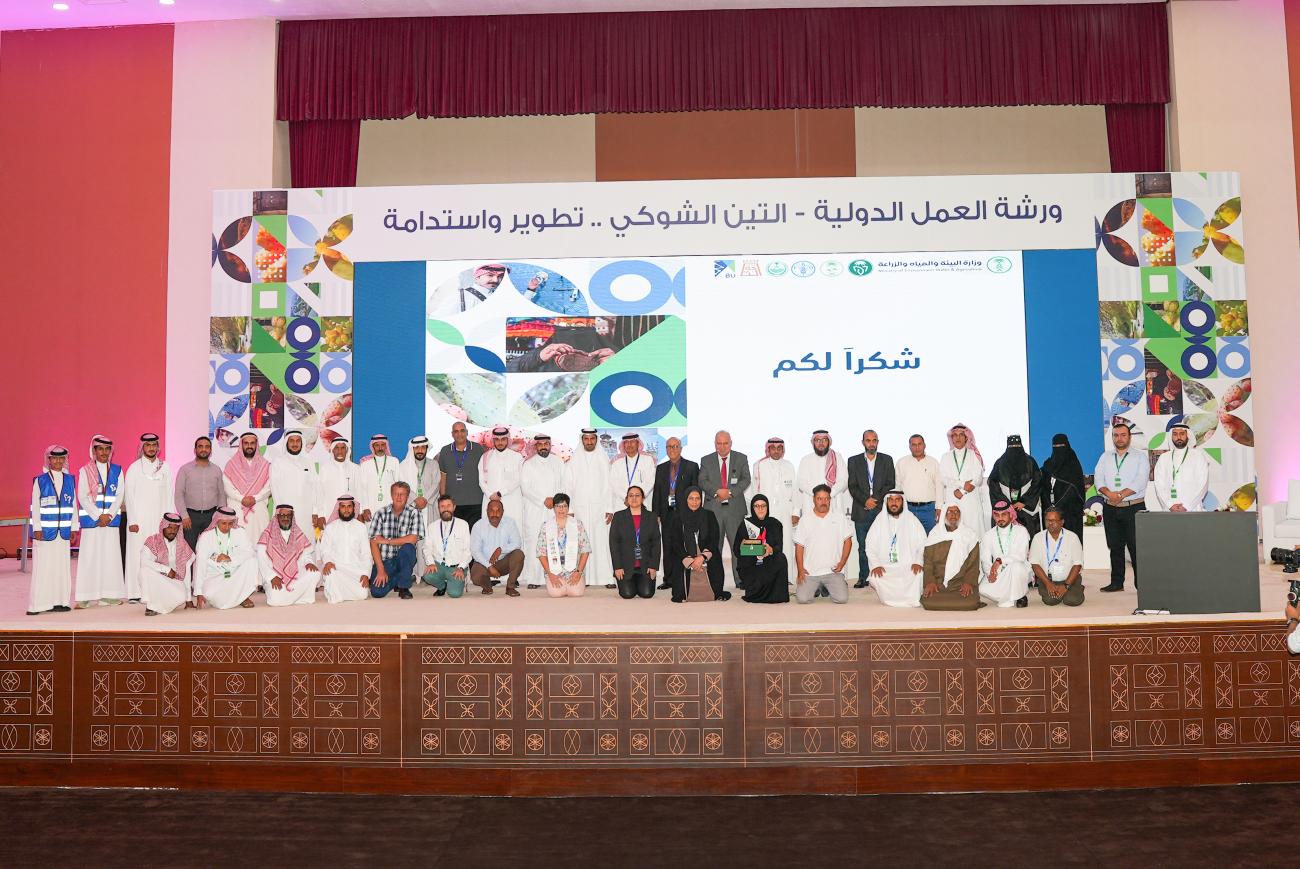Ministry of Environment Agriculture and Water in cooperation with FAO and international communities explore the potential use of cactus pear or AlBarshumy in the AlBaha Region, Saudi Arabia

The Ministry of Environment, Water and Agriculture (MoEWA) in cooperation with FAO, set a joint effort to explore the use of cactus pear (Opuntia ficus-indica)
Cactus pear, also known as Barshumy in the Kingdom of Saudi Arabia, has unique properties, diverse nature and a wide range of uses with economic benefits. This plant has been well adopted by countries characterized by arid and semi-arid climates. However, in Saudi Arabia the cactus pear introduced since more than century has been abandoned by farmers and invaded the forest and rangelands of the Al Baha and Assir and become a real threat of the biodiversity. The workshop aims at grouping experts from the international community to discuss the potential use of cactus pear and convert it from invasive species to cash crop.
Opening Ceremony
At the opening of the workshop “Pear Cactus: Development and Sustainability”, FAO Saudi Arabia Director (OiC), Dr Ayman Omer shared FAO’s long outstanding cooperation with the International Center for Agricultural Research in the Dry Areas (ICARDA) on the studies and promotions of Cactus Pear through the network called CactusNet (www.cactusnetwork.org). FAO-ICARDA International Technical Cooperation Network on Cactus plays an important role to promote technical cooperation through the dissemination of information from planting to market and exchange of field experience and database from its cultivation and uses and publishing of scientific research in the areas. Recently, FAO, in cooperation with ICARDA has issued a book entitled, “Crop Ecology, Cultivation and Uses of Cactus pear” that includes information on the genetic resources of the Cactus Pear, its physiological characteristics, soil types suitable for its cultivation and the pests affecting it. This 244-page book is made available in English and Arabic versions and the link was shared with visitors. Dr. Omer also emphasizes FAO commitment to contribute to the development of the national programme in combatting the cactus pear as an invasive plant and to value it as a cash crop through the use of best practices and modern technologies.
3-day Cactus Workshop
The workshop was held for 3 days from 8-10 August 2022 and it was attended by a number of government leaders, NGO, farmers and individuals especially from AlBaha and Assir. The event covers the crop’s planting, management, development, marketing and sustainability and the speakers shared good practices and management experiences from various countries from Argentina, Egypt, Tunisia, Mexico, South Africa, India as well as Saudi Arabia.
FAO displayed some videos and shared a number of publications related to cactus pear development and uses at its booth. The visitors’ feedbacks were positive on the new initiatives and perspective on cactus pear as it has huge potential for human consumption products, also a source of animal feed and medicinal uses.
The workshop concluded with recommendations and a field visit. Amongst the recommendations from the workshop are to conduct a survey study on the geographical distribution of the prickly pear in the Kingdom using modern technologies and field visits in order to map its distribution, assess its environmental impact and suggest appropriate sustainable agricultural practices. Farmers should be supported with the necessary skills and knowledge prior to adopting the Barshumy crop, especially in agricultural terraces and marginal lands. Al Barshumy should be adopted as an alternative resource for animal feed to overcome the shortage of fodder and possible droughts. Farmers should acknowledge the various high-value properties and uses of Al Barshumy in the market. An establishment of a prickly pear city, in AlBaha that consists of a factory for main and secondary products, storage, logistics and marketing facilities as well as an exhibitions platform would encourage farmers and rural families to participate. It has to primarily be supported by the establishment of genetic pools and mother fields for the different varieties/provenances of Al Barshumy. A research chair for prickly pear with the aim of encouraging researchers and graduate students to conduct studies and research related to investment and development as well as Al Barshumy’s cultivation and combating its pests. A dedicated Al Barshumy farmers' associations, cooperative societies and start-up companies that adopt an integrated approach to maximize the benefits of Al Barshumy products. Set up cooperation with research centers and international organizations (Such as FAO, ICARDA and other related institutions and organizations) in the various stages of the value chain related to the prickly pear. Consistent capacity building of farmers and stakeholders through holding workshops and training courses to raise awareness and scientific and practical skills to deal with AlBarshumy from planting to harvesting for the sustainability of AlBarshumi.

